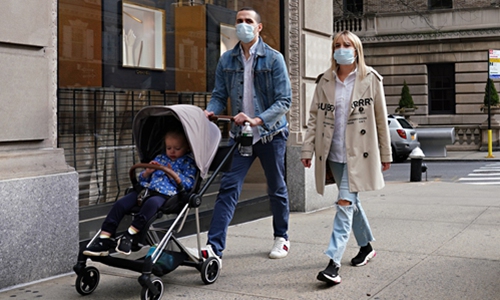Personal privacy vs public protection; a pandemic dilemma
By Rong Xiaoqing Source:Global Times Published: 2020/4/16 15:13:40

A family walk on Madison Avenue wearing protective masks during the coronavirus pandemic on April 08, 2020 in New York City. Photo: AFP
Despite confessing my beautiful or ugly thoughts every week here in this column, I am very a private person. I hate the prying questions of distant relatives, acquaintances, neighbors, and former classmates about my salary or marital status, and my plans concerning vacations, children and retirement. I don't think I would have been able to completely insulate myself from such pestering if I had stayed in China. I greatly cherish the privacy I am bestowed in the US.But since this COVID-19 pandemic started, the near-religious respect for privacy in the US has cast a shadow over the country's already slow response, and impeded its efforts to curb the virus and revitalizing the economy.
I was first frustrated by the zealous protection of privacy when some neighbors in my apartment building were confirmed to have been infected by the virus. I learned the news from an email sent by the building's management, but it provided no other details. Any attempt to discover which floors were involved was shut down by a stern warning: "Due to privacy and confidentiality laws, legal counsel has advised [management] to refrain from releasing any details pertaining to these residents."
I have no intention of seeking the names and addresses of these unfortunate neighbors, but I don't think this lip-zipped protocol of notification is doing us any good during this pandemic.
In their recent opinion article "These Coronavirus Exposures Might Be the Most Dangerous" in the New York Times, Joshua D. Rabinowitz, professor of chemistry and genomics at Princeton University, and Caroline R. Bartman, research fellow there, reminded us of a case during the SARS outbreak in Hong Kong in which a supercarrier infected many neighbors in his building, leading to 19 deaths.
"As a result of greater viral exposure, neighbors who lived in the same building were not only more frequently infected but also more likely to die," the scholars said. "By contrast, more distant neighbors, even when infected, suffered less."
Our building is the tallest in our neighborhood, with 33 floors and more than 300 apartments. It seems to me like a no brainer that neighbors in the vicinity of the infected need to take extra precautions, be it staying at home all the time or sealing the ventilators in their bathrooms. But a notification without specifying the location fails to deliver a heads-up to anyone in the building and only makes everyone fearful.
But simple common sense stands no chance against impenetrable privacy concerns. I talked to the manager and emailed the board members with suggestions I thought could protect both the privacy of the infected and the safety of people living around them, such as notifying neighbors on the floors above and below the floor where the infected people live. All such efforts were bounced back by the standardized response based on "legal counsel's advice."
This rigid adherence to privacy principles not only affects residents in my building, but it could impact prospects for an economic recovery in the US. As decision makers and experts ponder the idea of gradual lifting the shutdown and allowing those who have already developed antibodies to the virus go back to work and resuscitate the economy, creating an effective tracking system becomes a must-have.
But in this country an endeavor like this will all but certainly trigger a messy outcry. Indeed, both liberals and libertarian-conservatives have ratcheted up their alert systems. The American Civil Liberties Union issued a statement, noting: "People will only trust these systems if they protect privacy, remain voluntary, and store data on an individual's device, not a centralized repository."
Ned Ryun, founder and CEO of American Majority, lamented on Fox News: "We as the American people have to decide, are we going to wholesale surrender our liberties in hopes for a little security against a virus that I do not think will have the mortality rates of the Asian or Hong Kong flu? And if we do surrender our rights, we don't deserve to be a free people."
When facing a deadly novel virus and a pandemic that could drag everyone into the mud of a collapsing economy, no country will come out without a scratch.
China's iron-fisted tracking and quarantining system, which relied a lot on foot soldiers from residential committees wearing red arm bands, worked effectively in controlling the virus. But it still led to some complaints about the lack of privacy for the infected.
In South Korea, laws safeguarding privacy were loosened after the MERS outbreak in 2015, allowing authorities to disclose more information about infected people in order to better protect the general public. But public shaming and stigma became an instant issue during this pandemic after some infected people, whose names were withheld, were identified by the public using information the authorities had released.
In the end, every country has to reach a delicate balance between privacy and public health. There is no perfect solution. But when lives are at stake, even as a very private person, I can see which side of the seesaw should carry most weight.
The author is a New York-based journalist and Alicia Patterson fellow. rong_xiaoqing@hotmail.com
Posted in: COLUMNISTS,VIEWPOINT